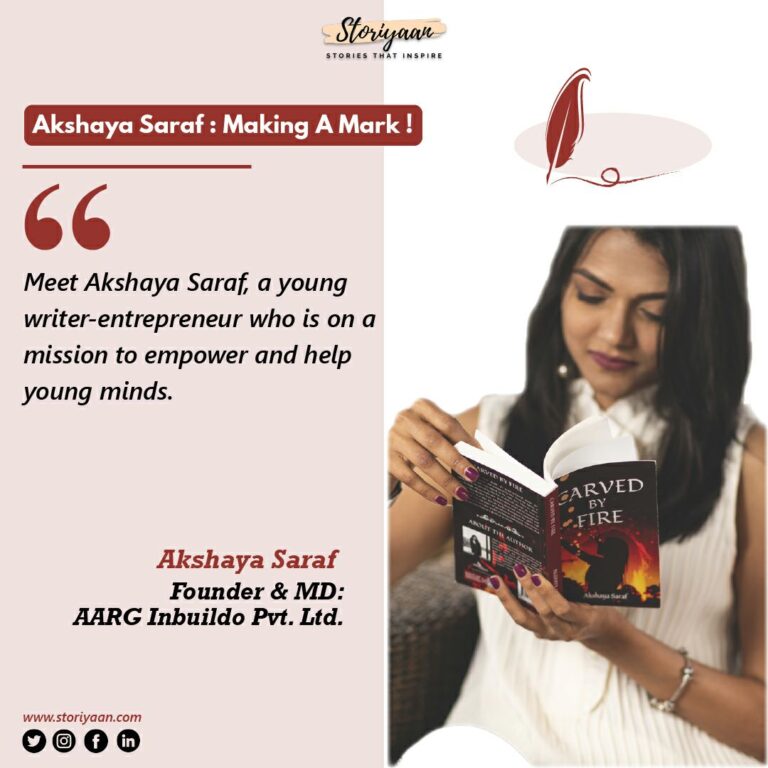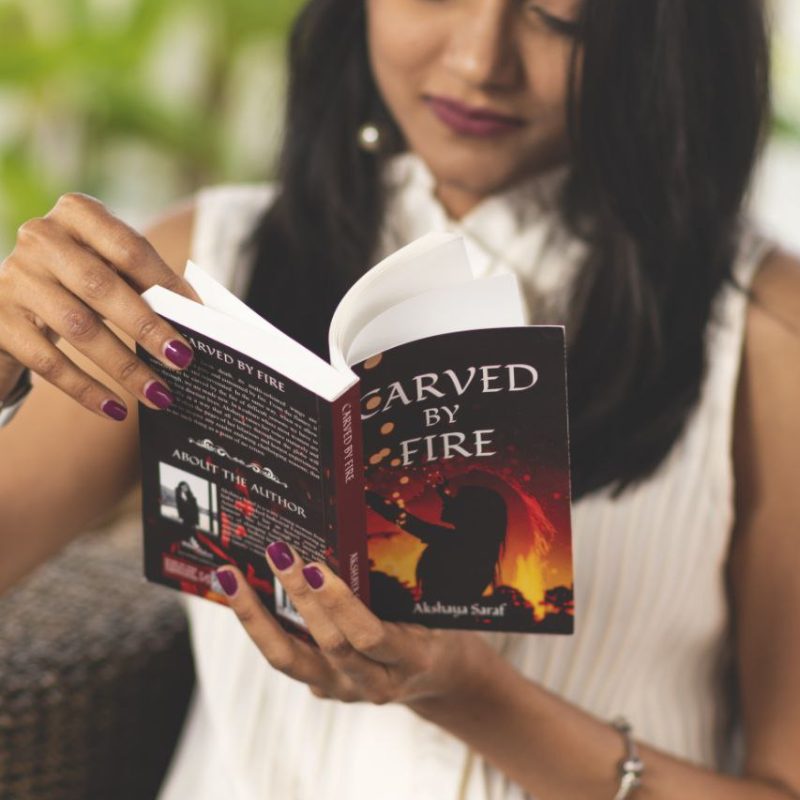The mining sector is one of many industries that face gender inequality where women’s equitable participation and inclusion have taken a back seat. While many women give up, Akshaya Saraf, the Promoter and Director of Operations at AARG Inbuildo Mining Enterprise, chose to face the challenges and rise above them. Akshaya Saraf is a young entrepreneur and also the Chairman of the Govindam Foundation, which provides more than 5 lakh meals to underprivileged children in Hospet.
Many discouraged her from moving forward into the mining sector, a “Male-centric” industry. However, Akshaya’s father has always been a source of motivation for her. The struggles she faced in the patriarchal mining industry, the change in her family traditions, and her mental health prompted her to write the book “Carved by Fire“. The book has helped many young girls face day-to-day situations with much ease!
Catch Akshaya Saraf take Storiyaan through her ups and downs in the mining industry and what inspired her to write “Carved by Fire”

AKSHAYA SARAF- MAKING A MARK!
Interview
Questions and answers
Your book "Carved by Fire" incorporates the struggles you faced trying to make your mark in the patriarchal mining industry. Can you share the obstacles that made you the person you are today with our readers?
The struggles and challenges that I faced as a woman entrepreneur in the mining industry are generic to the challenges that are prevalent in the heaviest industries today. It starts with the perception that this is a “Man’s job”, given how highly regulated our industries are we are often having to spend countless hours meeting people, often tough, highly accomplished, powerful men. While there is no reason for knowing me, I wanted to share my journey in this rather off-beat profession, my personal struggle as a young woman growing up in young India, and also shed light on the fact that we can overcome our personal fears, mental struggles, issues. It is our individual choices that make us who we are.
When you initially started the venture, what were some of the short-term goals you set for yourself, and how did they benefit you?
My journey as an author started with an article I wrote for my old school that was just a snippet of my struggles. The article got published in the Alumni section of the school magazine. Several girls reached out to me, saying they had those issues too, and asked me to elaborate more on what I did. People found my articles relatable while I found their personal stories relatable too. The Principal called me and said that I could inspire more people than I thought and I should consider writing more. So that is how I started my journey as an author.
As for venturing into the mining industry, I come from a family that has been in the business of mines and minerals. Having the good fortune of being amongst the best minds the industry has seen, I found many role models and mentors that gave me the confidence to pursue the space. The industry is a rather technical one, wherein in the long run, attention to detail technical knowledge and skills highly impact the outcome of one’s endeavors. I have pursued my formal education in industrial engineering having completed my graduation from North Eastern University, Boston. While I was getting myself educated I also had the chance to complete specialty courses very relevant to my industry at Harvard University. So, yes my short-term goal was to prepare myself to the best of my abilities and its benefits cannot be underestimated.
Tell us about the reactions of your family and friends when they first heard about your decision to embark upon an entrepreneurial journey in the mining industry?
This mining business is a family business and is supposed to be a very male-centric business. Initially, when my father was grooming me for the company, one of my father’s friends told him that he had a daughter and he should consider selling the business. I will never forget my father’s response, he said, “My daughter will run the company and achieve the success that no son can achieve”. This statement has been with me, and I swore that I would carry his words.
Being a female leader in one of the most male-dominated industries in India is no easy feat. Could you share with our readers some of the stereotypes you were subjected to and how you dealt with them?
Initially, when I went for meetings, people would ask my colleague, “why is a child in the meeting?”, ” Does this girl even understand what we are saying?” but I ignored it because a reaction is not required every time reminding myself that actions speak louder than words. Even after working for around a decade in this industry, people still assume I don’t know what I am saying. So I feel this is a war, and you win one battle at a time. The critical thing to remember is you have to keep at it. No amount of failure should discourage you, and no amount of success should go to your head. It is very important to have people to guide you and mentor you as you go through the challenges posed by the industry. For me that person was my father, I generously borrowed from his experiences to shape my thinking, temperament, and style of working.
Being the promoter and director of operations for a 600+ person mining enterprise, what things do you have to bear in mind when dealing with your human resource?
I feel emotions play a huge role while dealing with people. Nobody works for money; they work for respect. If employees don’t feel respected in your organization, they will not stick for too long. So as a leader, I make sure that I listen to my people and have an open-door policy so anybody can walk in and share their problems. People disagree with this idea, but this is my way of doing work. I will always be there for my people.
What inspired the title for your book "Carved by Fire", and how did the first draft of the book take shape?
The book has a long journey. It almost took me one and a half years to write it. The last chapter was done, I finalized the font, and tragedy struck again; my dadima (paternal grandmother) passed away in an accident. Her passing taught me the importance of letting go and brought the statement to life, “if you have failed, it’s okay. Start over because this time you start with experience.” Thus, I started over, rewrote the whole book with an additional chapter dedicated to her.
Can you share with our readers some advice that those trying to get their books published for the first time might find helpful?
One thing I will recommend is staying patient. Hundreds of people will not believe in you and think your writing is amateur. As long as you do YOU, you will find a publisher. Also, there are options to self publish these days; you need to market your book well, and you will reach your audience. While writing a book is more natural to an author, we must be mindful of all the work that goes into getting a book published and then market it. If you are not prepared for the latter, you may find the experience disheartening at first.
Do you believe that writing your story helped you analyze yourself better? If yes, how?
Writing my story helped me understand my emotions better. It helped me analyze how I react to situations and are those reactions right? I always felt the need to accommodate everyone else’s emotions and feelings and discount what I felt. Writing my book changed that about me. Every person has the right to feel what they feel and choose who they let into their lives. The more I understood myself, the better I got at controlling my emotions. I would recommend everyone grab their laptops and start writing; you don’t have to be good; you just have to try.
What are some of the things about the publishing industry that you wish you had known before you started writing?
The publishing industry is brutal! They need you to have a name before you have a name which means they want you to be famous before becoming famous. I think this is a big let-down, and that’s why I called my book nobody’s statement to deal with life. I wish someone had told me: “You need to be ready to be criticized through every inch of your being; Be consistent and relentless; don’t let anyone’s opinion of you or your story bring you down. Most importantly, big publishers will want your story to fit a mold, don’t let anyone change your story.”
I always knew my purpose for writing this book. I knew I wanted to help people who have gone through something similar. Even if one person reads my book and feels like this is a better way of handling situations or that it’s okay to feel the way they are feeling, I’ll be the happiest person alive.
Rapid-fire
1. One word that describes you best – Crazy
2. The best decision you have taken regarding your career – To have patience in every step I take
3. One misconception people usually have about the mining industry – That it’s not for women
4. One show that you never get tired of watching – The office

